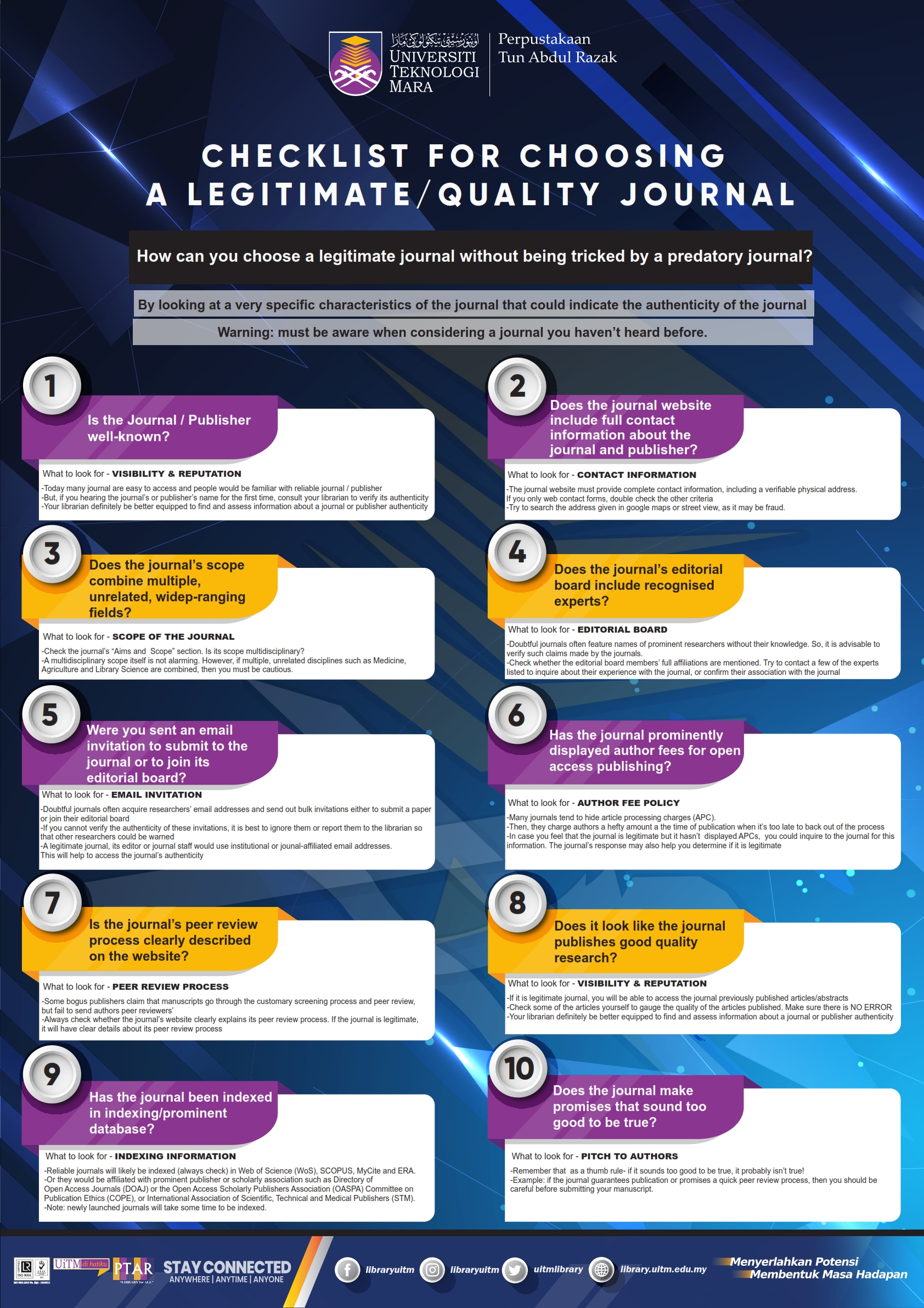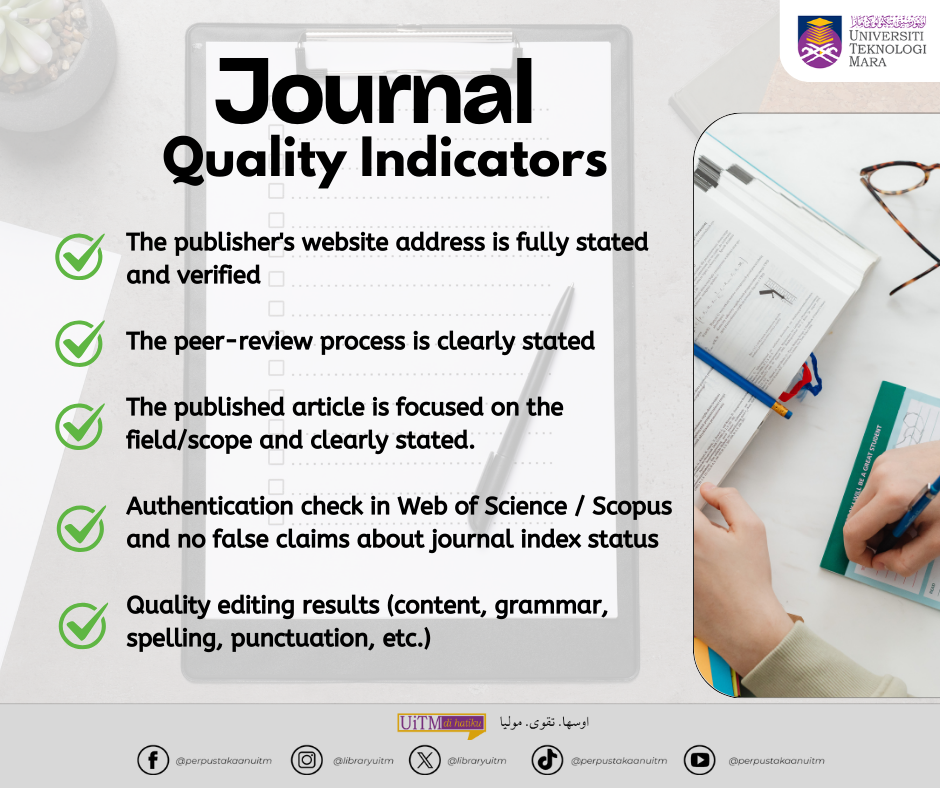This Library Guide will help you identify the Predatory journals and Publishers and related information
A predatory journal is a publication that exploits the open-access model by charging authors high fees without providing the standard editorial and publishing services associated with legitimate academic journals. These journals often engage in unethical practices, such as:
- Lack of Peer Review: They typically skip or perform minimal peer review, resulting in the publication of low-quality or fraudulent research.
- Misleading Information: They may falsely claim to have a high impact factor or reputable indexing.
- Aggressive Solicitation: They often aggressively solicit submissions from researchers, sometimes sending repeated emails.
- Hidden Fees: They might not disclose the full extent of their publication fees until the paper is accepted.
- Unqualified Editorial Boards: They often list scholars on their editorial boards without permission or include individuals with dubious credentials.
- Rapid Acceptance: They might have an unusually quick acceptance process, which is a red flag for inadequate peer review.
Researchers are advised to carefully vet journals before submitting their work, using resources like the Directory of Open Access Journals (DOAJ) and Beall's List, which track and identify potentially predatory publishers.
CHECKLIST FOR CHOOSING A LEGITIMATE/QUALITY JOURNAL

How can you choose a legitimate journal without being tricked by a predatory journal?
By looking at very specific characteristics of the journal that could indicate the authenticity of the journal
Warning: you must be aware when considering a journal you haven’t heard of before.
1: IS THE JOURNAL / PUBLISHER WELL-KNOWN?
What to look for - visibility & reputation
Today many journals are easy to access, and people are familiar with reliable journals/publisher
But, if you hear the journal’s or publisher’s name for the first time, consult your librarian to verify its authenticity
Your librarian will definitely be better equipped to find and assess information about a journal or publisher's authenticity
2: DOES THE JOURNAL WEBSITE INCLUDE FULL CONTACT INFORMATION ABOUT THE JOURNAL AND PUBLISHER?
What to look for - Contact Information
The journal website must provide complete contact information, including a verifiable physical address. If you only use web contact forms, double-check the other criteria
Try to search the address given in Google Maps or Street View, as it may be fraud.
3: DOES THE JOURNAL'S SCOPE COMBINE MULTIPLE, UNRELATED, WIDED-RANGING FIELDS?
Check the journal’s “Aims and Scope” section. Is its scope multidisciplinary?
A multidisciplinary scope itself is not alarming. However, if multiple, unrelated disciplines such as Medicine, Agriculture and Library Science are combined, then you must be cautious.
4: DOES THE JOURNAL’S EDITORIAL BOARD INCLUDE RECOGNISED EXPERTS?
What to look for Editorial Board
Doubtful journals often feature names of prominent researchers without their knowledge. So, it is advisable to verify such claims made by the journals.
Check whether the editorial board members’ full affiliations are mentioned. Try to contact a few of the experts listed to inquire about their experience with the journal or confirm their association with the journal
5: WERE YOU SENT AN EMAIL INVITATION TO SUBMIT TO THE JOURNAL OR TO JOIN ITS EDITORIAL BOARD?
What to look for Email invitation
Doubtful journals often acquire researchers’ email addresses and send out bulk invitations either to submit a paper or join their editorial board. If you cannot verify the authenticity of these invitations, it is best to ignore them or report them to the librarian so that other researchers can be warned.
A legitimate journal's editor or staff would use institutional or journal-affiliated email addresses. This will help to assess the journal’s authenticity
6: HAS THE JOURNAL PROMINENTLY DISPLAYED AUTHOR FEES FOR OPEN-ACCESS PUBLISHING?
What to Look for in Author Fee Policy
Many journals tend to hide article processing charges (APC).
Then, they charge authors a hefty amount at the time of publication when it’s too late to back out of the process
If you feel the journal is legitimate but hasn’t displayed APCs, you could ask the journal for this information. The journal’s response may also help you determine if it is legitimate
7: IS THE JOURNAL’S PEER REVIEW PROCESS CLEARLY DESCRIBED ON THE WEBSITE?
What to Look for Peer Review Process
Some bogus publishers claim that manuscripts go through the customary screening process and peer review but fail to send the author's peer reviewers
Always check whether the journal’s website clearly explains its peer review process. If the journal is legitimate, it will have clear details about its peer review process
8: DOES IT LOOK LIKE THE JOURNAL PUBLISHES GOOD-QUALITY RESEARCH?
What to Look for in Visibility & Reputation
If it is a legitimate journal, you will be able to access the journal's previously published articles/abstracts
Check some of the articles yourself to gauge the quality of the articles published. Make sure there is NO ERROR
Your librarian will definitely be better equipped to find and assess information about a journal or publisher's authenticity
9: HAS THE JOURNAL BEEN INDEXED IN INDEXING/PROMINENT DATABASE?
What to look for in Indexing information
Reliable journals will likely be indexed (always check) in Web of Science (WoS), SCOPUS, MyCite and ERA.
They would also be affiliated with prominent publishers or scholarly associations, such as the Directory of Open Access Journals (DOAJ), the Open Access Scholarly Publishers Association (OASPA), the Committee on Publication Ethics (COPE), or the International Association of Scientific, Technical, and Medical Publishers (STM).
Note: Newly launched journals will take some time to be indexed.
10: DOES THE JOURNAL MAKE PROMISES THAT SOUND TOO GOOD TO BE TRUE?
What to Look for Pitch to Authors
Remember that as a thumb rule—if it sounds too good to be true, it probably isn’t!
For example, if the journal guarantees publication or promises a quick peer review process, you should be careful before submitting your manuscript.

